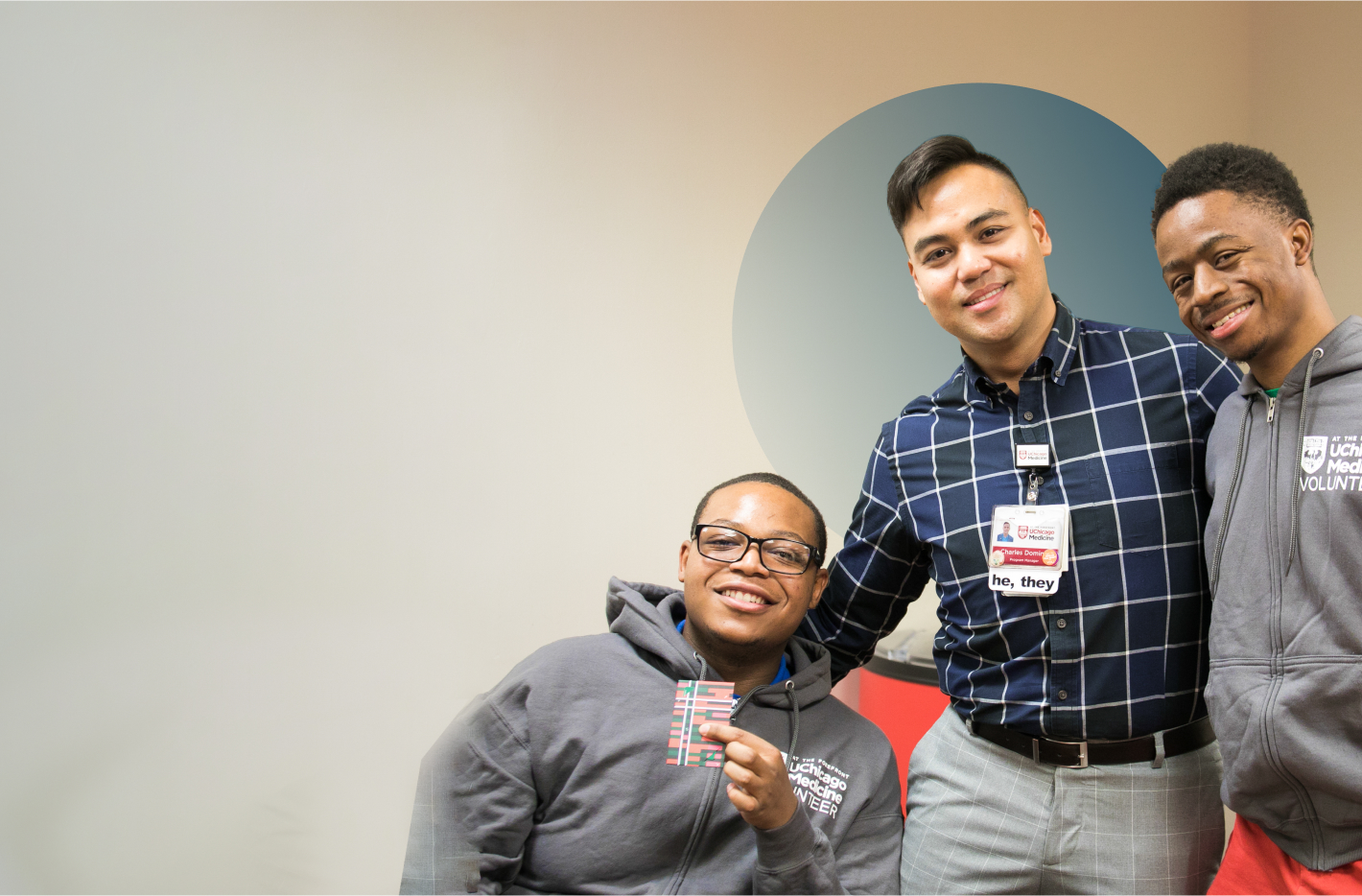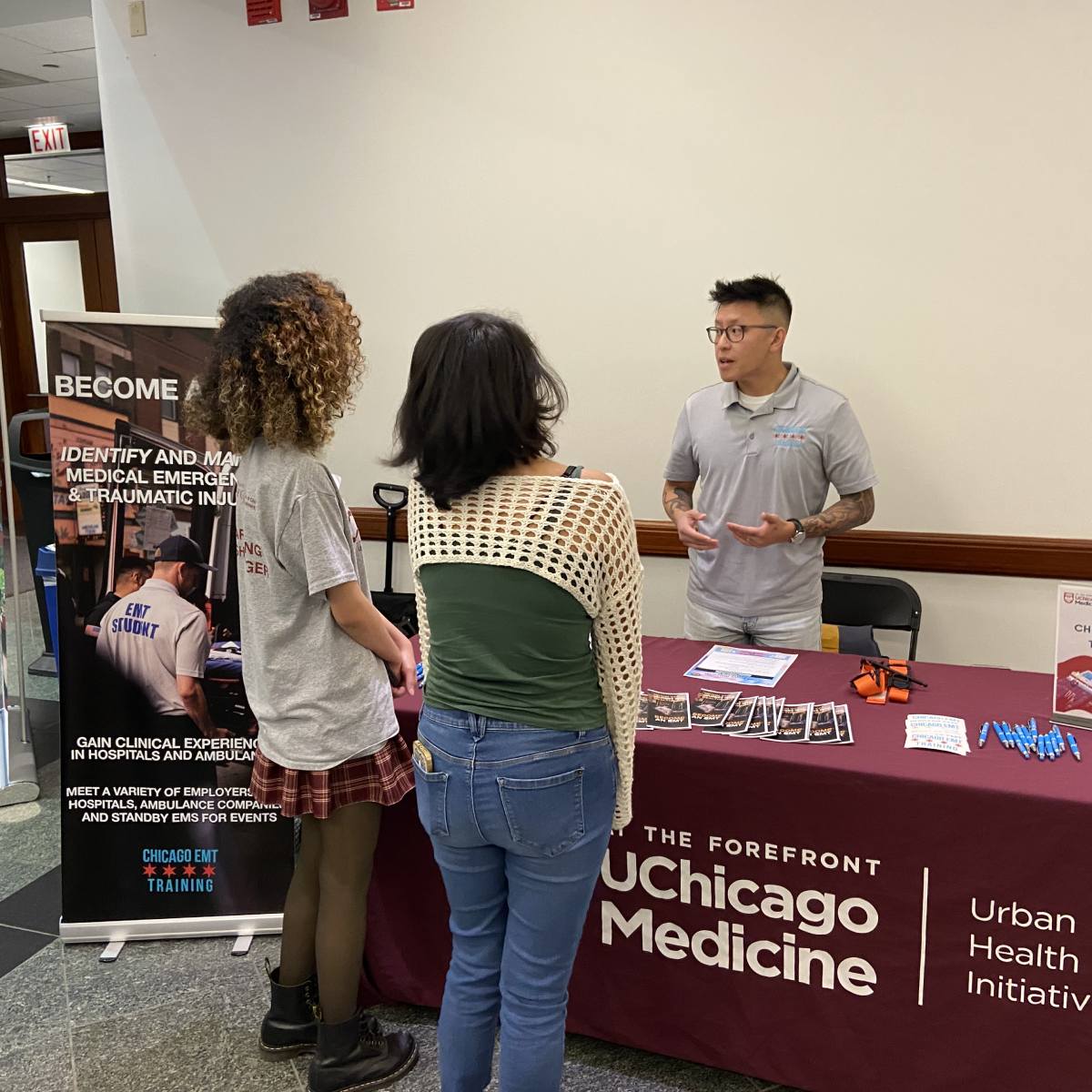
Working
towards
independence
The University of Chicago Medicine works together as a partner with Southside Occupational Academy staff to develop opportunities across the hospital. We work with each student as an individual to allow them to be as independent as possible.”
Joshua Long, Principal, Southside Occupational Academy
Southside Occupational Academy

Southside Occupational Academy (SOA) is a Chicago Public Schools transition center serving students with disabilities 18 to 22 years old. A major part of SOA is to connect work-ready students with community partners in a year-long internship. Gaining real world job skills opens up more economic opportunities for SOA students.
Stable employment is an example of a social driver of health, also known as social determinant of health (SDOH). UChicago Medicine’s partnership with SOA is just one way the hospital is working on the issues of social drivers of health. Since 2010, UChicago Medicine has placed SOA students in internships in Food Services, Environmental Services and Security departments. In the 2023-2024 school year, 13 students had about 6,240 hours of job skills training.
Social Drivers of Health
Social drivers of health (SDOH), also known as social determinants of health, are the conditions where people are born, grow, live, work and age. SDOH play an important part in driving health outcomes. Up to 80% of health outcomes are influenced by such things as a person’s finances, housing, access to transportation and nutritious food. This means that most of our health is influenced and decided by things that happen outside the doctor’s office.
UChicago Medicine provides many different services and programs to help lessen inequities caused by social drivers of health. Read more to learn how these resources increase access to care, address food insecurity, and grow job opportunities for communities on the South Side.
UChicago Medicine - Cook County Health Neurology Clinic Partnership

Neurologists from UChicago Medicine and Cook County Health Provident Hospital work together as partners to expand access to care to the community. These experts treat conditions of the brain, spinal cord and nerves.
This partnership allows more patients, with or without insurance, to have access to needed medical tests, scans and treatment plans. This collaboration also allows smooth long-term care from the inpatient hospital to the outpatient clinic. Patients are given the best transition of care, without loss of continuity. Through this program, patients learn lifestyle changes that help them in their recovery to better health.
At the clinic, each patient is assigned a Liaisons in Care (LinC) or an Accountable Care Coordination Team (ACCT) Community Health Worker (CHW) who can help with:
- Transportation needs
- Planning home visits for health management
- Providing education on preventative care and symptom management
- Planning follow-up visits
- Removing barriers to care
Fresh
Start
Surgical
Gifts
UChicago Medicine increases access to medical care in a partnership with national non-profit, Fresh Start Surgical Gifts. Fresh Start transforms the lives of infants, children and teens with physical deformities (any change that makes part of the body a different size or shape that is not what it would normally be, or causes it to function improperly) caused by birth defects, accidents, abuse or disease.
Medical services – including surgery and care before and after surgery – are donated by volunteer doctors, clinicians and other medical staff during designated Surgery Weekends. Surgery Weekends help patients with conditions that are not covered by state-funded programs.
UChicago Medicine also provides coverage of medications, parking and meals when a patient is in the hospital. In 2023, six patients had complex reconstructive surgery at no cost to the family.
340B
Prescription
Drug
Program
The 340B Prescription Drug Program allows UChicago Medicine and other hospitals caring for a large group of uninsured and low-income patients, to offer medications at discounted prices. The 340B Program is very important to the hospital because the University of Chicago Medical Center is one of the largest providers of Medicaid services in Illinois.
The savings from the 340B Program allows UChicago Medicine to provide important basic services to patients and the surrounding community. Read more on how UChicago Medicine invests in the health of the community with some of its pharmacy programs.
Some patients may not take their medications as prescribed because the cost of the medicine is too high. The Medication Access and Affordability Program provides cost savings to uninsured or underinsured patients who have high copays. For example, the University of Chicago Medical Center offers uninsured or underinsured patients a set price of $5 or $10 for a 30-day supply of commonly prescribed drugs such as antidiabetic medications as well as devices like inhalers.
Patients who live around the University of Chicago Medical Center do not have easy access to a pharmacy. These areas are known as a pharmacy deserts. To make sure patients get their medications when they need it, the hospital offers a free medication home delivery service. This delivery service helps patients who are not able to travel to a pharmacy.
After a hospital stay, a patient who leaves the Medical Center must follow their medication plan in order to heal. The Meds2Beds Program makes sure that patients have access to their prescribed medications before they leave the hospital. The program also offers medication counseling to make sure the patient knows how to take prescribed medications. Refills can be mailed to a patient’s home so they don’t have problems filling their medications.
Feed1st
Pantry
Program:
Science in
Service
Having access to nutrient-rich foods is needed for good health. One of UChicago Medicine’s main health goals is to lessen inequities caused by food insecurity. Our South Side communities have some of the highest rates of food insecurity in the city. Nearly 40% of people who live in the South Side service area have low food access.
C4P Community Garden Program

The goal of the Comprehensive Care, Community and Culture Program (C4P) is to improve the overall health and well-being of patients. Patients are also given access to a Community Health Worker who helps with any social needs.
With funding from the Robert Wood Johnson Foundation, people in the program can plant and harvest in a learning garden on a rooftop deck within the University of Chicago Medical Center. A trained chef, doctors, diabetes educator and other volunteers teach groups on how to cook with ingredients grown in the garden.
C4P has several ongoing partnerships with neighboring community gardens. C4P worked with the Urban Growers Collective and Neighborspace to turn a vacant lot in Woodlawn into a working community garden and a space for arts and wellness programming that began in Spring 2022.
Growing food in many different garden spaces gives community residents more access to fresh, healthy produce.
Hiring in our communities
of our total workforce lived on the South Side in fiscal 2023
of fiscal 2023 University of Chicago Medical Center new hires lived on the South Side
of fiscal 2023 Ingalls Memorial new hires lived in the Ingalls Memorial service area
UChicago Medicine Workforce Development Programs

UChicago Medicine Workforce Development Programs
UChicago Medicine’s workforce development programs and partnerships create advancement and development opportunities for current employees as well as local talent from our South Side and South Suburban communities, particularly for people of color.
Career pathway programs, such as the Nursing Support Assistant Pathway and the Pharmacy Technician Apprenticeship programs, provide help with education and employment. These programs work with community members and current workers to find careers that are in high demand. The programs allow community members to get the skills and certifications needed for jobs within UChicago Medicine.
Internal development programs provide special training to advance people of color into new career paths, higher wage roles and leadership positions, increasing racial equity across our workforce. Two of these programs are Rise Higher and Evolve.
On average, every year 23% of all people who are hired at UChicago Medicine live on the South Side. Many come from our strong partnerships with community workforce organizations, such as Skills for Chicagoland’s Future (SFCF), where we hire an average of 100 people per year. Nearly 100% of people hired from SFCF are BIPOC (Black, Indigenous and People of Color) and over 90% are still working at UChicago Medicine one year after completing the program.
The Nursing Support Assistant Pathway and Pharmacy Technician Apprenticeship Programs are two very important career pathway programs. Both programs find people from the community who have never worked in healthcare before. These programs provide training and education to prepare people for positions at UChicago Medicine as Nursing Support Assistants or Pharmacy Technicians.
- The Rise Higher program provides diverse, high-performing frontline employees with training and mentorship to prepare them for leadership positions.
- Since its beginning, and in a little over one year, Rise Higher has supported the promotion of over 25 people from non-management to leadership positions. Most of these people are from our BIPOC (Black, Indigenous and People of Color) workforce population.
- In 2023, the Rise Higher program expanded to include employees at Ingalls Memorial.
Evolve is a 10-week training program to build the skills of diverse entry-level employees. Evolve prepares people to seek new and better careers in the organization.
Career Exploration Programs

Since 2021, UChicago Medicine’s Urban Health Initiative has hosted several High School Healthcare Career events. During the events, students from South Side high schools spend the day learning from healthcare professionals about their work. This includes learning about different ways to start a career in healthcare as well as career programs for youth. In 2023, 165 students attended these career events.
- The Heart and Vascular Center (HVC) Mentorship Program aims to increase the number of people of color in healthcare professions. This two-year program introduces under-represented 11th and 12th grade students to the field of medicine and healthcare careers using hands-on and real-world workshops and activities.
- Many of the students are from South Side high schools and get a chance to be connected to volunteer doctors, nurses, advanced practice providers, medical technicians, researchers, executives, engineers and other professionals. In fiscal 2023, 15 students took part in the HVC Mentorship Program.
- The Medical Careers Exposure and Emergency Preparedness Program (MedCEEP) works to increase the number of minorities in the field of medicine. The program also focuses on problems of poor healthcare, low health literacy, violence, lack of access to quality healthcare providers, and systemic injustices in under-served communities.
- Students from South and West Side high schools learn emergency response skills as they are shown careers in the medical field. Since it started, MedCEEP has trained more than 7,000 students and adults in emergency preparedness.
- Through a partnership with UChicago’s Office of Civic Engagement, UChicago Medicine’s Digestive Diseases Center hosted two high school interns in 2023. The two interns are from South Side service area and were selected following a rigorous application process.
- The interns shadowed gastroenterologists Dr. Edwin McDonald, Dr. Alan Hutchinson and Dr. David Rubin during procedures, outpatient clinics, and inpatient rounds. Two interns also worked with faculty members, nurses, dieticians, pharmacists and trainees in interventional gastroenterology, pathology, hepatology, surgery, inflammatory bowel disease, and anesthesia.
- In 2024, the program will expand to include three interns and a research component.

